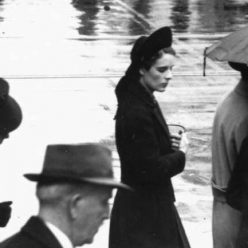Shopkeeper William “Scotty” Manson, 47, lived alone behind Acme Stamp and Hobby, supplying used books and collectable stamps to the passing trade. Any customer was potentially a worthy one in the SRO Land of 1956, as Bunker Hill was crumbling and the detritus of human life washed ever further each morning onto the streets surrounding Skid Row.
When two gents came in together and asked for a quantity of books to be boxed, Manson thought he’d made his grubstake for the day. Alas, the fellows had a further request: could he just be so kind as to place all his money in the box as well? A flash of a long knife accompanied the suggestion.
Like any savvy shopkeeper of his place and era, Manson was armed, with a .45 caliber revolver in his pocket. He stepped back and drew his weapon, but the young man with the knife was quicker, and slashed his chest and belly. The would-be thieves turned and ran as Manson unloaded his weapon, then collapsed in the door of his shop. At General Hospital, where he was taken in serious condition with three deep cuts, he told police what had happened.
But even without Scotty’s report, the scene on the street told the tale. One robber, Charles Brooks, 28, resident of a hotel at 224 Boyd, reached 1st and Broadway, then fell, gushing blood. He survived part of the ride to Georgia Street Receiving Hospital, where he was DOA.
The second miscreant, Eugene Sparkman, resident of a hotel at 534 Wall, made the acquaintance of a motorcycle cop a block from where Brooks went down, and was popped. Taken into evidence was the book he’d kept hold of as he fled, reform-minded prison warden Lewis E. Lawes‘ “20,000 Years in Sing Sing,” with its heartwarming dedication “To those tens of thousands of my former wards who have justified my faith in human nature.” We can only hope he ran into as enlightened a prison manager as Lawes, in his unreported but inevitable next stop.
